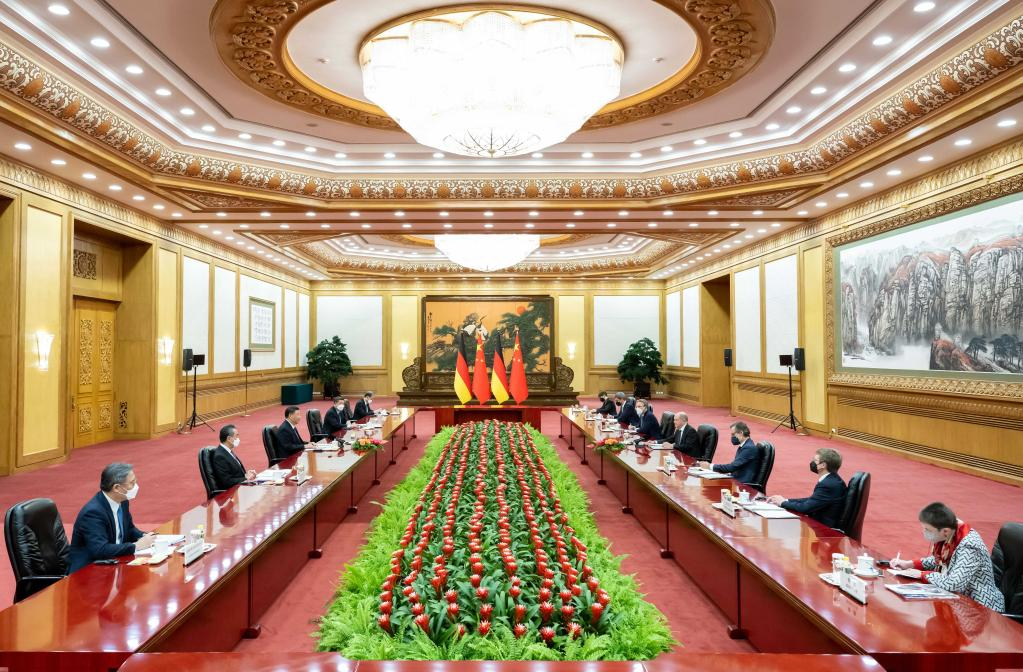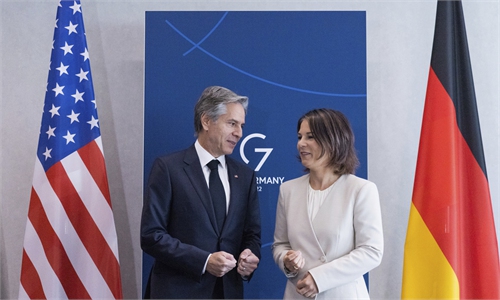Xi urges Ukraine peace talks, warns against nuclear crisis in Eurasia in meeting with Scholz

Chinese President Xi Jinping meets with German Chancellor Olaf Scholz on his official visit to China at the Great Hall of the People in Beijing, capital of China, Nov 4, 2022. Photo:Xinhua
Chinese President Xi Jinping reaffirmed China's support for Germany and Europe playing an important role in facilitating peace talks on the Ukraine crisis and building a balanced, effective and sustainable security architecture in Europe when he met with German Chancellor Olaf Scholz on Friday.
Under the current circumstances, the international community should: support all efforts conducive to the peaceful settlement of the Ukraine crisis and call on relevant parties to remain rational and exercise restraint, start direct engagement as quickly as possible, and create conditions for the resumption of talks, according to the meeting, Xi said.
The international community should also oppose the threat or use of nuclear weapons, advocate that nuclear weapons cannot be used and that nuclear wars must not be fought, and prevent a nuclear crisis in Eurasia, Xi noted.
It should also work together to keep global industrial and supply chains stable and forestall disruptions to international cooperation in energy, food, finance and other areas and consequent damage to global economic recovery, especially the economic and fiscal stability of developing countries, make joint efforts to tide civilians in areas affected by the crisis through the winter, and improve the humanitarian situation to prevent a humanitarian crisis happening on a bigger scale, Xi said.
Those consensuses reached at the meeting echoed China's consistent position on the Ukraine crisis, Chinese experts said. The opposition to nuclear weapons is also in line with the common stance of the international community, as Western media continued hyping the use of nuclear weapons by Russia.
"Opposing a nuclear war in Eurasia is the bottom-line, which is also the redline. In fact, Russia holds a similar attitude despite the fact the US has been fabricating the nuclear threat by Russia in hijacking Europe," Wang Yiwei, director of the Institute of International Affairs at the Renmin University of China, told the Global Times on Friday.
The Russian Foreign Ministry published a statement on Wednesday saying that Moscow strictly adheres to the principle of the inadmissibility of nuclear war in terms of its nuclear deterrence policy. "In implementing its policy on nuclear deterrence, Russia is strictly and consistently guided by the tenet that a nuclear war cannot be won and must never be fought," the statement reads.
Rejecting the use of nuclear weapon is a consistent stance of the international community and Russia has said that it won't use nuclear weapons, but Western media continued hyping the matter, a Beijing-based expert on international affairs who preferred not to be named told the Global Times on Friday.
Clearly, the Western media misinterpret our stance, as China won't pick a side and its position on [the Ukraine crisis] is objective, and their ill-intentioned attempt won't be able to cause discord between China and Russia," he said.
Some experts noted that the reason why those consensuses could be reached between China and Germany is because security and order in Europe has been greatly disrupted by the Russia-Ukraine conflict instigated by expansion of US-led NATO, causing long-term damage to Germany's economic growth.

